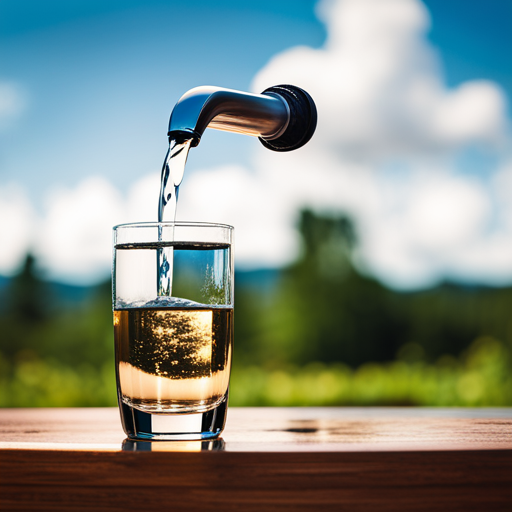Are you tired of drinking water that tastes harsh and leaves unsightly deposits on your glassware? Fortunately, there’s a simple solution that can improve the taste of your water and make it more palatable for drinking and cooking.
Water softeners are a popular choice for homeowners who want to remove minerals like calcium and magnesium that can make water taste unpleasant. By using a water softener, you can enjoy a smoother texture and lighter flavor in your drinking water, which is perfect for making tea and coffee.
Softened water also helps to reduce the buildup of limescale and other deposits on your kitchen appliances, which can extend the lifespan of your equipment. While some people have concerns about the sodium content of softened water, it is generally safe for consumption and has been approved by the Environmental Protection Agency (EPA).
In this article, we’ll explore the benefits and considerations of using water softeners for better-tasting water.
Key Takeaways
– Softened water can provide a smoother and lighter texture, as well as a lighter and less harsh flavor due to the absence of calcium and magnesium.
– Softened water is generally safe for consumption and can be great for various kitchen appliances, making it more palatable and cost-effective than bottled water.
– Softened water may have slightly higher levels of sodium, which can have a slightly salty flavor, but this shouldn’t be noticeable or problematic for most people.
– Softened water is a matter of preference and can offer other benefits beyond taste, such as easier dishwashing and cleaning of metal faucets, but those on a low sodium diet may want to consider a water softener that doesn’t use sodium.
Softened Water Benefits
You’ll enjoy the smoother texture and lighter flavor of water when using a water softener, which also saves you money on bottled water and makes tea and coffee taste better.
Water softener installation can have a positive impact on your plumbing by reducing buildup and extending the life of your pipes and appliances.
With soft water, you’ll also have an easier time washing dishes and cleaning metal faucets in your bathroom and kitchen.
In addition, softened water is generally safe for consumption and works well in various kitchen appliances. It can also have a unique texture that some people prefer over hard water.
Overall, the benefits of using a water softener go beyond just better tasting water and can greatly improve the overall quality of your household water.
Sodium Content Considerations
If you have concerns about your sodium intake, it’s important to note that the level of sodium in softened water may vary depending on the hardness of your water. Softened water that uses salt to regenerate may have slightly higher levels of sodium, while sodium-treated softened water may have a very slightly salty flavor.
However, the amount of sodium in softened water shouldn’t be noticeable or problematic for most people. If you have health concerns or are on a low sodium diet, there are low sodium options for water softeners available.
It’s important to choose a water softener that doesn’t use sodium or has a low sodium content to ensure that you are not compromising your health in any way. By opting for a low sodium option, you can enjoy the benefits of softened water without worrying about your sodium intake.
Pets and Softened Water
Pets can safely drink softened water, but it’s important to monitor them for any adverse reactions. While softened water is generally safe for consumption, it’s important to make sure that your pets are not experiencing any negative effects from drinking it.
Some pets may have sensitivity to the sodium content in softened water, or may simply prefer the taste and texture of unsoftened water. As a responsible pet owner, it’s important to pay attention to your pet’s reactions to the water and make adjustments as needed.
In addition to monitoring pet reactions, it’s also important to consider the overall water quality when using a water softener. While softened water can offer benefits such as smoother texture and better taste, the process of softening can also introduce additional contaminants into the water.
It’s important to regularly test the water quality and ensure that the softener is functioning properly to avoid any potential health risks for both pets and humans. By taking these precautions, you can ensure that your pets are able to safely enjoy the benefits of softened water.
Conclusion
Now that you’ve learned about the benefits and considerations of using water softeners for better-tasting water, you may be wondering if it’s the right choice for you.
If you’re someone who enjoys the taste of water and wants to improve the overall quality of the water in your home, a water softener can be a great investment. Softened water can make a noticeable difference in the taste and texture of your water, making it more enjoyable to drink and use in various kitchen appliances.
However, if you have concerns about the sodium content of softened water or have pets that rely on untreated water, it’s important to weigh the potential drawbacks before making a decision.
Overall, using a water softener can be a simple and effective way to improve the taste and quality of your water, but it’s essential to consider the potential downsides and make an informed decision that works best for you and your household.




